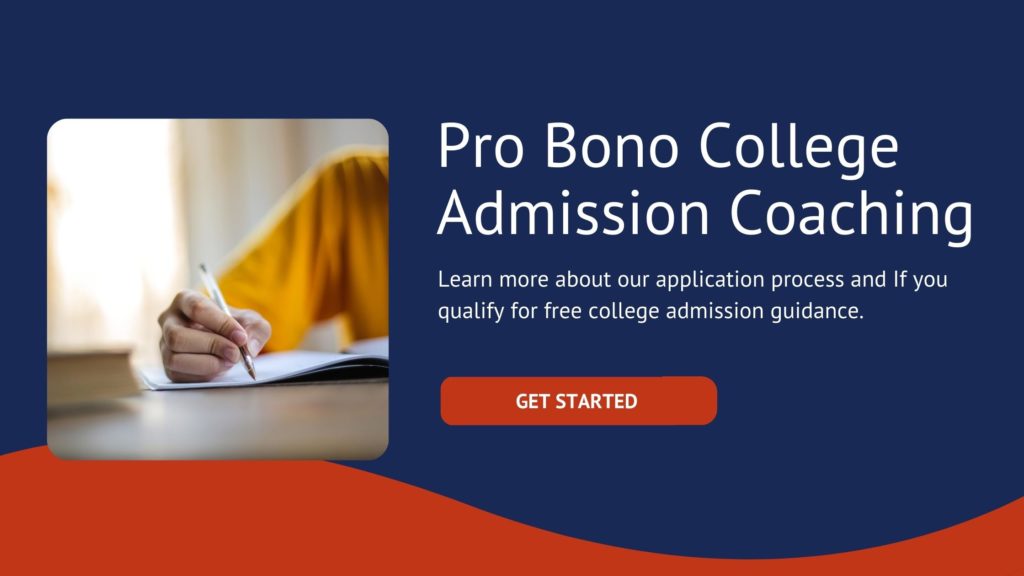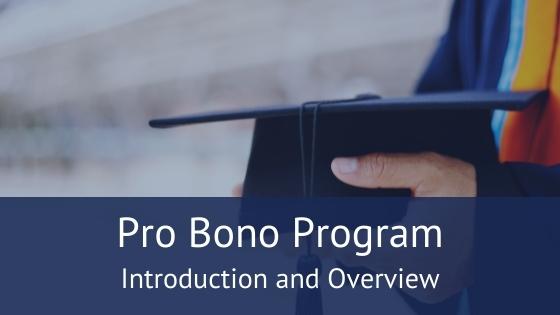A problem we struggle with in the college consulting industry is equity. We know that many deserving and brilliant students don’t have the resources necessary to use our services, and while we do put out many free resources, there is no substitute for face-to-face interactions and personalized, bespoke advice.
To that end, and to give back to the Houston community that has done so much for us, Ivy Scholars has launched a new pro-bono service, and we’re eager to begin working with students! In this article, we are announcing our new pro bono college consulting program and will introduce you to what our pro-bono service is, our goals with it, and how you can benefit.
Our Pro-Bono Service
Ivy Scholars has been taking on pro-bono students for as long as we’ve been a company. While we helped all our students, both pro-bono and paying, get into amazing schools and land some great scholarships, we knew that having a more developed system would let us help more students more efficiently.
Now, we’re pleased to announce our new system for working with pro-bono students is up and running.
Here’s how our system works:
- Students are nominated by a teacher or counselor.
- We review the applications to find the students who can benefit the most from our help.
- We let the students know they’ve been selected, introduce them to their mentor, and let them know what our process involves.
- Each student receives 20 hours of mentoring, used to apply to whatever schools they wish, in alignment with their goals.

Our biggest improvements to the system come in how we’re finding new pro-bono students; our path for helping them is the same as how we help all the students we work with, and we are pleased with our results.
Once students are working with mentors, they go through our five-phase structure of college applications:
- Phase 1: Planning. In this phase, we work with students to determine what they want from their college experience, and how best to get it. Whether its top schools, best chances for a scholarship, or a specific major, we tailor each engagement to match a student’s needs and strengths.
- Phase 2: Details. Next we deal with the details, the little pieces that trip you up if left too late. We help students fill out the application portals, compose their activities lists, and pick teachers to ask for letters of recommendation.
- Phase 3: First Essays. Here we begin the writing process with the core essays. We start with the personal statement, and UT Austin’s supplemental essays. These get students used to the writing process, and familiarize them with our methods.
- Phase 4: Finish Writing. In this phase, we compose the remaining supplemental essays the student needs. This phase may be shorter or longer, depending on which schools the student is applying to, as different schools want varying numbers of essays.
- Phase 5: Final Touches. Finally we take care of any remaining details. Here we discuss interviews, applying for financial aid, and visiting schools. We also talk with students about how to choose between several schools. Our obligation to students does not end when the applications are submitted.
With this structure, we help students write the best applications possible, and get into the best schools they can. While pro-bono students sometimes have different concerns or priorities from our other students, we are able to help them succeed as well.
Our results speak for themselves, with previous pro-bono students getting accepted into Rice, Columbia, and the business honors program at UT Austin McCombs. Another student received a full-ride scholarship to the University of Houston Bauer College of Business, as their primary concern was paying for college.
Why We’re Doing This
We’ve been lucky enough as a company to find a home in Houston. Many of our customers come from word of mouth, and the community has been very welcoming to us. We wanted to do something to give back to the community that has done so much for us, and so we began taking on pro-bono students.
Finally, we want to acknowledge that college admissions are inherently unfair. Some schools have many more resources to help students, and some students have more time and resources to devote to applications generally. Help from companies like ours exacerbates an existing problem. By offering pro-bono services, we want to help bridge this gap, and help deserving students gain admissions to top colleges.
How We Can Help You
If you’re interested in our pro-bono services, you can find the web page for them here. While we are only accepting nominations from teachers and counselors at this time, we still have many other resources on our site we encourage you to make use of (after all, that’s why we spent so much time making them). Now, we’ll give you an overview of our resources, and where you can find them.
The first resource to turn your attention to is our downloadable guides. These cover a number of important topics in the admissions process, and our ultimate guide contains almost all of our curriculum material. These are the same documents we use with our students, organized in the same way, meant for you to be able to work through on your own. This is a great place to start, and if you only decide to use one of these, we suggest it is this guide.
Next are our guides for certain types of students. We have specific guides for student-athletes, international students, homeschooled students, transfer students, and art students. Each of these groups has unique concerns in their application process, and these guides serve to address these. If you fall into one of these categories, we suggest using the appropriate guide.
Our blog covers a great many topics, usually, ones too niche to fit in elsewhere. Of special note is our post on financial aid, though you may find a lot of other helpful advice in the articles. The blog also has sections for students interested in test prep or candidacy building.
Our college fact sheets are a useful resource but can feel overwhelming, so we’ll spend a bit more time talking about how to use them. These fact sheets cover almost every detail about a college, and we add more all the time. The first major section is on admissions information; the deadlines to apply, the acceptance rate, average test scores for the school, and what they want from your application.
For top schools, we then have a section on admissions strategy. This explains what exactly the school is looking for in applicants, and how best to show it to them. For schools that require essays, we have downloadable guides with examples of essays and analyses. These will help you answer a school’s specific essay questions.
The next sections are on the school’s academics and campus life. You shouldn’t read these straight through, instead of skimming the headings to find the pieces you are interested in, and explore the links in depth. The section on financial aid comes next. This explains how much a school costs, and what financial aid resources are available for their students.
Final Thoughts
We are pleased to have the opportunity to give back to the community that has welcomed us so warmly and hope that with our new program we will be able to help many bright young students find the future they deserve.
If you are a teacher or counselor, we encourage you to nominate any students of yours who you believe would be a good fit for our program. The only way we can find these students is for you to bring them to our attention, and we ask for your help in this process. We all want to help students succeed, and get into the best schools for them and their future.








